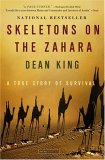Reading Guide Questions

Please be aware that this discussion guide will contain spoilers!
- Just before the crew of the Commerce was captured by desert nomads, Riley
stole some water from Dick Deslisle, the only black crew member. In his
notes, the author observes that, although this theft might possibly be
construed as an act of racism, Riley was, for a man of the early nineteenth
century, "remarkably free of bigotry." Do you agree with this
assessment of Riley's character? Why or why not?
- In North America the discourse on slavery is understandably dominated by
the paradigm of white plantation owners and black slaves. Throughout
history, however, slavery has existed in a number of different forms on
almost every continent in the world. How did reading Skeletons
on the Zahara broaden your understanding of the institution of slavery?
- Sidi Hamet is one of the most complex individuals in Skeletons on the
Zahara. Even Riley "could never fully understand his ways." To
what degree was Sidi Hamet's decision to help the sailors motivated by
kindness? To what degree was his decision motivated by the prospect of
financial gains?
- Dean King notes that many an outsider has been perturbed by what T. E.
Lawrence called the "crazed communism" of the desert. Indeed,
Riley was shocked when a horde of Sahrawis descended freely upon a camel
that Sidi Hamet had slaughtered to eat. Later, however, Riley and his men
benefited from the hospitality of friendly Sahrawi tribes and must have
begun to realize the value of sharing resources in the harsh desert. Can you
name other examples in the book of desert customs that seemed peculiar at
first but later revealed their value? Have you ever found a custom strange
upon first glance, recognizing its beauty only later?
- After the shipwreck, Riley "felt a swell of regret at the unfettered
pursuit of wealth" practiced in the United States. Indeed, in Riley's
era, men routinely risked their lives in order to eke out a living—and
often paid the ultimate price. Can you think of any modern-day equivalents
to this scenario?
- Under U.S. law, Riley was allowed to command the crew of the Commerce as a
father would his children. Do you think Riley was a good leader? Did he make
any decisions that you consider misguided or questionable? Did his authority
over his men ever break down? Offer examples from the text to support your
answers.
- Although it may seem somewhat difficult to believe—especially since
Riley and his men were often spat upon for being "Christian
dogs"—the Quran holds Christians and Jews in relatively high regard.
Were the men of the Commerce ever treated with the respect traditionally
afforded to "People of the Book"?
- The camel is essential to the survival of the Sahrawis. It is a means of
transportation, a source of meat and nutrient-rich milk, and a signifier of
status. Can you think of another example in which the lives of a people are
or were so dependent on a single natural resource or geographic feature? The
ancient Egyptians and the Nile River is one example.
- What do you think about Riley's sacrifice of Antonio Michel? Was it, as
Dean King asserts, "best for his men, preserving for them an
indisputable leader rather than an outsider, and an old man at that"?
Or was it a cowardly act?
- During World War I, soldiers in opposing trenches shared a bond forged in
the fire of brutal common experience. At the same time, they felt
disconnected from the people who remained at home, who they believed could
never understand the horror of war. Did the Commerce crew, who shared the
hardship of the desert with the Sahrawis, ever yield to the same psychology?
Unless otherwise stated, this discussion guide is reprinted with the permission of Back Bay Books.
Any page references refer to a USA edition of the book, usually the trade paperback version, and may vary in other editions.







